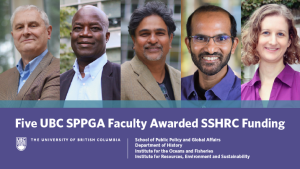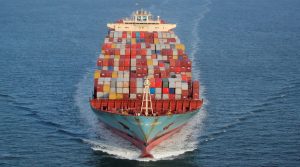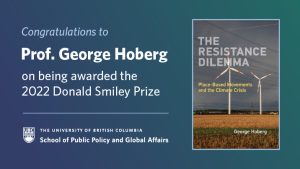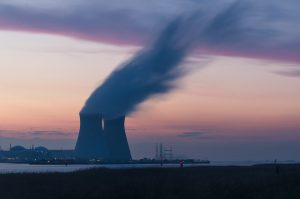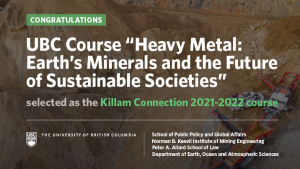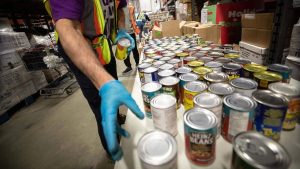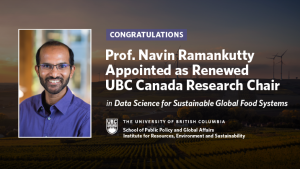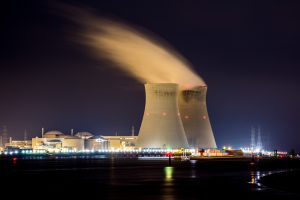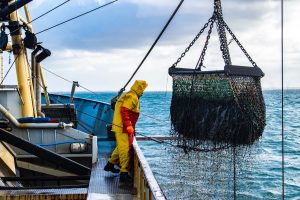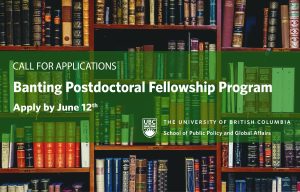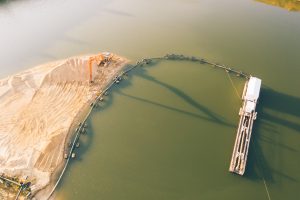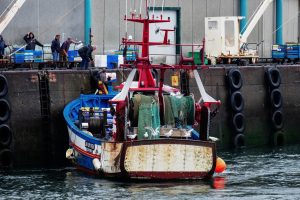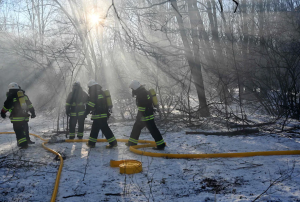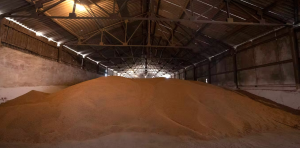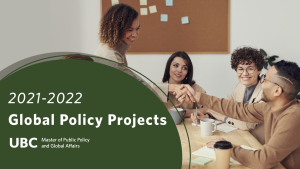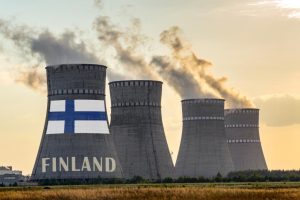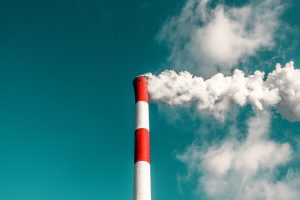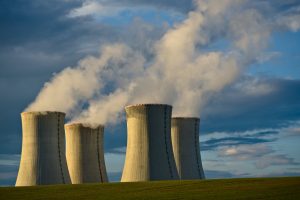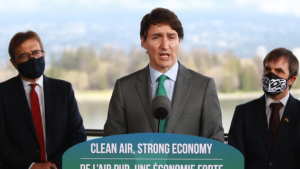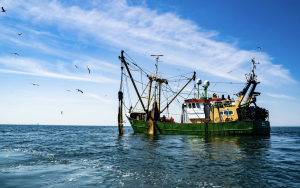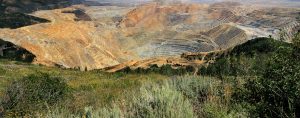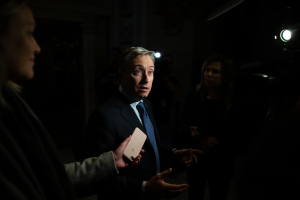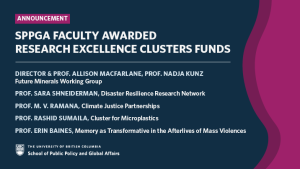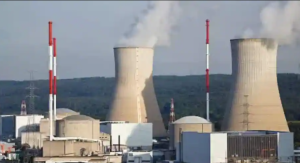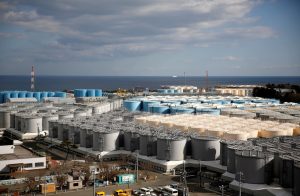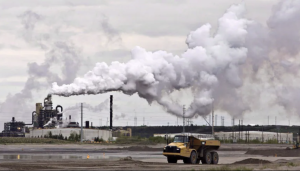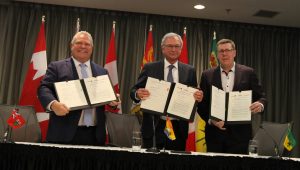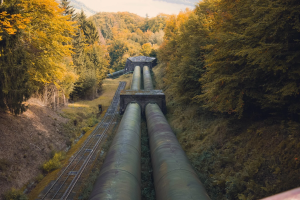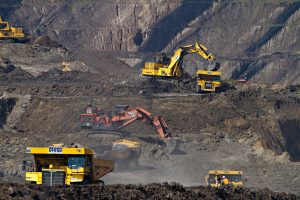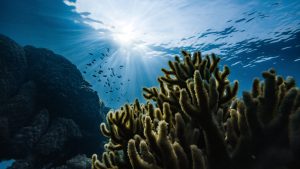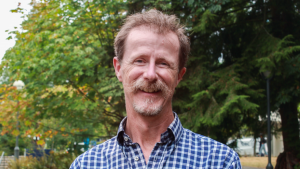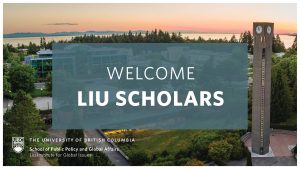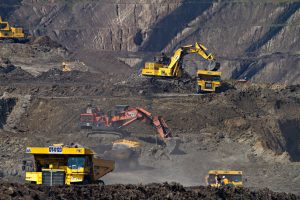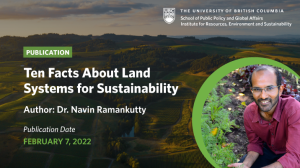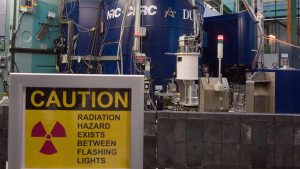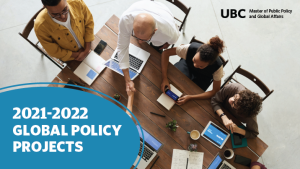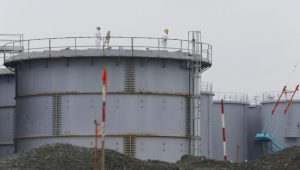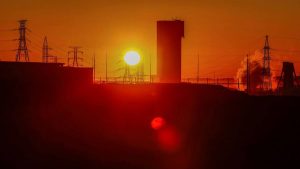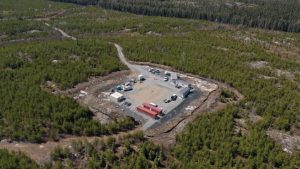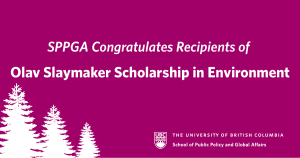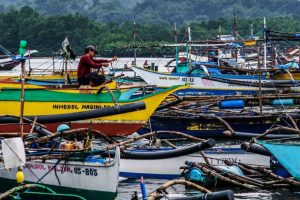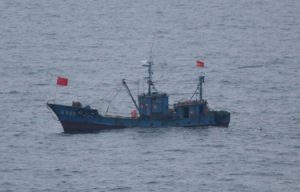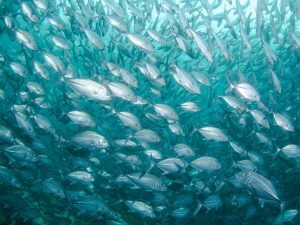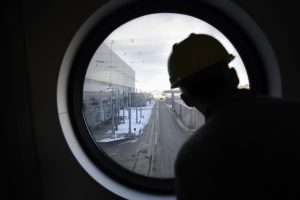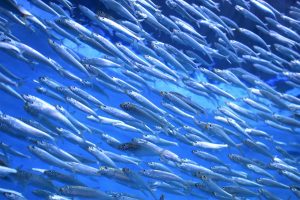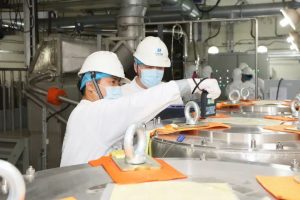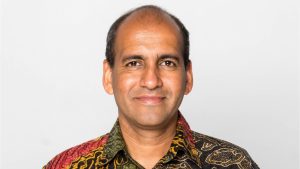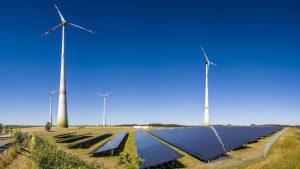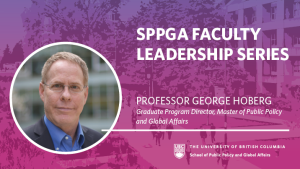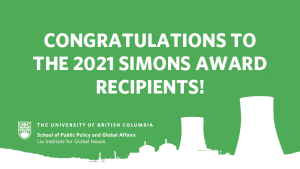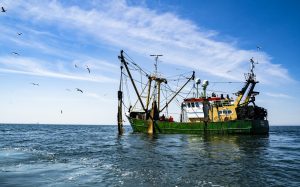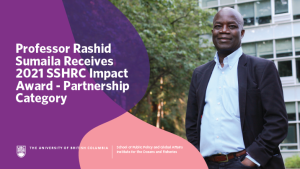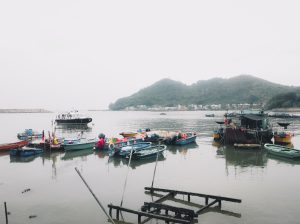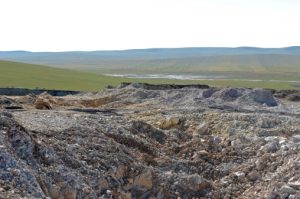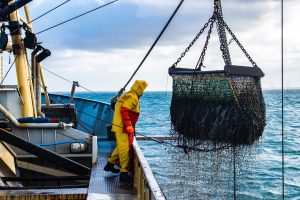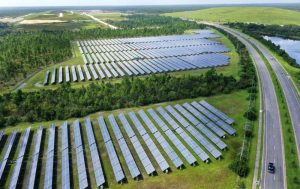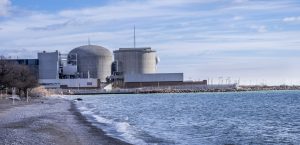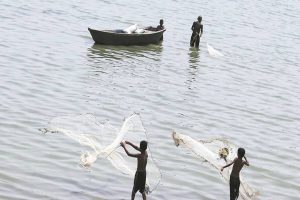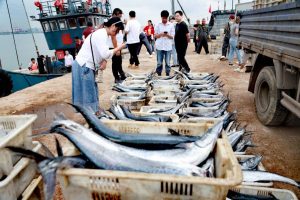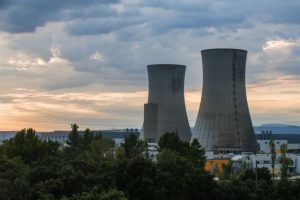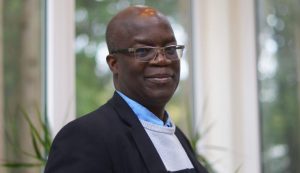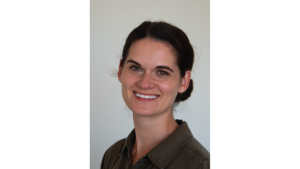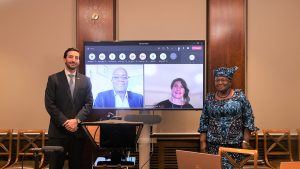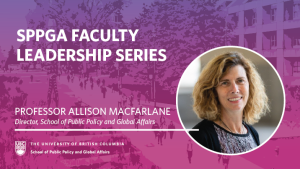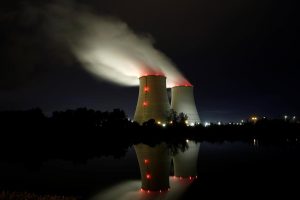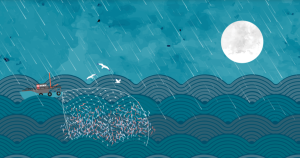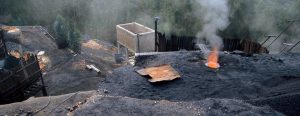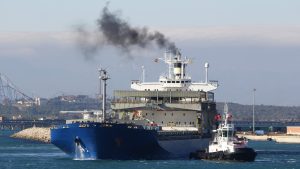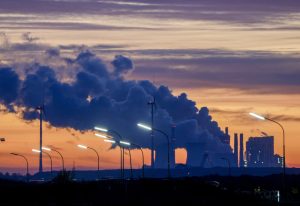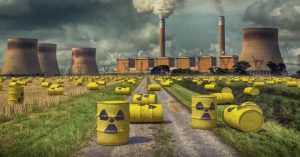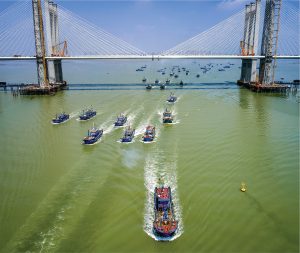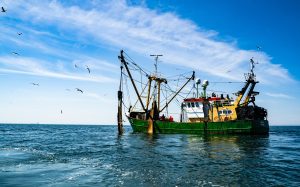UBC and Stanford-led Research Finds Small Modular Reactors will Exacerbate Challenges of Highly Radioactive Nuclear Waste
Small modular reactors, long touted as the future of nuclear energy, will actually generate more radioactive waste than conventional nuclear power plants, according to research from the University of British Columbia and Stanford.
Prof. M.V. Ramana: Molten Salt Reactors Were Trouble in the 1960s—And They Remain Trouble Today
Prof. M.V. Ramana authors an article examining the use of molten salt reactors, and why they pose more of a risk than reward as a source of nuclear power.
2022 Global Policy Project Symposium
Leading up to their graduation, MPPGA students from the class of 2022 presented their policy findings at the annual Global Policy Project Symposium held by the UBC School of Public Policy and Global Affairs.
Five UBC SPPGA Faculty Awarded SSHRC Funding for Projects
Profs. Rashid Sumaila (SPPGA; IOF), Timothy Cheek (SPPGA; History), Heidi Tworek (SPPGA; History), Milind Kandlikar (SPPGA; IRES), and Navin Ramankutty (SPPGA; IRES) received SSHRC funding through Partnership Development, Partnership Grants, and Insight Grants for various projects.
Prof. Rashid Sumaila: WTO Hopes to Avoid Stalemate at Upcoming Geneva Ministerial
A study by Prof. Rashid Sumaila (SPPGA; IOF) on fisheries subsidies in India is mentioned in an article discussing India’s public food procurement agenda ahead of the upcoming WTO ministerial conference.
Prof. George Hoberg Awarded 2022 Donald Smiley Prize
Professor George Hoberg was awarded the 2022 Donald Smiley Prize by the Canadian Political Science Association for his book, The Resistance Dilemma: Place-Based Movements and the Climate Crisis.
Director and Prof. Allison Macfarlane: Why Nuclear Energy is on the Verge of a Renaissance
SPPGA Director and Prof. Allison Macfarlane discusses the global attitude shift towards embracing nuclear power and safe energy storage methods with CNBC News
Joint Graduate Course “Heavy Metal” Wins Killam Connection Competition
“Heavy Metal,” a new collaborative course jointly sponsored by SPPGA, the Department of Earth, Ocean & Atmospheric Sciences, Peter A. Allard School of Law, and the Norman B. Keevil Institute of Mining Engineering at UBC, is the latest winner of the Killam Connection competition.
Senior Fellow Gisele Yasmeen: Food Banks Brace for Summer of Hunger
Senior Fellow Gisele Yasmeen discusses the impact of inflation on Canadian food banks, and who suffers the most, with CBC The National.
Prof. Navin Ramankutty Appointed as Renewed Canada Research Chair in Data Science for Sustainable Global Food Systems
Prof. Navin Ramankutty (SPPGA; IRES) was appointed as a renewed Tier 1 Canada Research Chair (CRC) in Data Science for Sustainable Global Food Systems. Prof. Ramankutty is one of four new and renewed CRCs in the Faculty of Arts at UBC.
Prof. M.V. Ramana: Do We Need Nuclear Power to Stop Climate Change?
Prof. M.V. Ramana discusses the debate over the apparent need for nuclear power to fight climate change and adopt green energy alternatives.
Prof. Rashid Sumaila: The Future of Fishing and Fish Hinges on Economics and the Idea of ‘Infinity Fish’
Prof. Rashid Sumaila (SPPGA; IOF) discusses the future of fishing and the planet’s ability to achieve “infinity fish.”
Prof. Paul Evans: Huawei 5G Ban puts UBC Research Partnerships in the Spotlight
Prof. Paul Evans discusses Canada-China relations in the wake of a ban placed by the federal government on companies, Huawei and ZTE, from working on Canada’s 5G wireless networks.
Call for Applications: 2022 Banting Postdoctoral Fellowship Program
The UBC School of Public Policy and Global Affairs welcomes applicants interested in applying for the prestigious Banting Postdoctoral Fellowship Program.
Prof. Nadja Kunz: Water Management Issues in the Mining Industry
Prof. Nadja Kunz (SPPGA; Mining Engineering) discusses water management issues in the mining industry with Sheryl Mackay, host of the CBC podcast series, North by Northwest.
Prof. Philippe Le Billon: Fish Crimes in the Global Oceans
Prof. Philippe Le Billon (SPPGA; Geography) co-authors the first global analysis research article examining data linkages among fisheries-related violations from 2000 to 2020.
Prof. Allison Macfarlane: IAEA Finds Normal Radioactivity at Chernobyl on Disaster’s Anniversary
SPPGA Director and Professor Allison Macfarlane raises concerns about the threat that the Russia-Ukraine war poses to nuclear power plant sites in Ukraine.
Honorary Research Associate Nathan J. Bennett: Mainstreaming Equity and Justice in the Ocean
Honorary Research Associate Nathan J. Bennett (SPPGA; IRES) writes a journal article about equity and justice considerations in marine conservation, fisheries management, and blue economy development.
Director and Prof. Allison Macfarlane: Nuclear waste: Concerns of a Storage Facility in Southern U.S.
SPPGA Director and Prof. Allison Macfarlane discusses concerns around safety and storage of nuclear fuel in interim storage facilities in West Texas.
Prof. M.V. Ramana: Increased Interest and Concerns About Small Modular Reactors (SMRs) and Advanced Modular Reactors (AMRs)
Professor M.V. Ramana is mentioned in a Hokkaido Shimbun article about the increasing attention on small modular reactors (SMRs) and the development of new advanced modular reactors (AMRs) in the UK.
Prof. Philippe Le Billon: Sand Mining: Stopping the Grind of Unregulated Supply Chains
Professor Philippe Le Billon (SPPGA; Geography) co-authors a journal article about the environmental impact of sand mining and the need for supply chain regulations in the industry.
Gisèle Yasmeen: ‘Too Many People, Not Enough Food’ isn’t the Cause of Hunger and Food Insecurity
Senior Fellow Gisèle Yasmeen writes an article on The Conversation about the role of inequity and armed conflict in causing food insecurity.
Prof. Philippe Le Billon: Beyond Local: Conservation has to Adapt in an Era of Climate Change
Professor Philippe Le Billon (SPPGA; Geography) co-authors a Midland Today article suggesting non-traditional approaches to conservation, including ways to address climate-induced displacement.
Global Policy Projects: MPPGA Students Engage with Clients on Policy Challenges
The Global Policy Project allows MPPGA students to engage with policymakers and client organizations to solve a real-world policy challenge. Learn about some of this year’s projects, with topics related to housing crisis, climate policy and reconciliation.
Prof. M.V. Ramana: Nuclear Waste Management: Is Finland’s Onkalo Facility Safe?’
Professor M.V. Ramana discusses the impacts Finland’s plans to store nuclear waste in an underground facility will have on the environment, humans, and other living organisms.
Prof. George Hoberg: BC’s Climate Plan in Light of IPCC Report
Professor George Hoberg comments on the promises outlined in B.C.’s climate plan in light of the newly released IPCC report. Watch on CBC Vancouver News at 6 (starts at 7:29).
Director and Prof. Allison Macfarlane: Nuclear waste: Similar Concerns in the U.S. and in Japan, with No Solution in Sight
SPPGA Director and Prof. Allison Macfarlane discusses concerns around safety and storage of nuclear fuel in interim storage facilities in West Texas.
Prof. George Hoberg: Why the Federal Government’s Climate Reduction Roadmap Moves Canada in the Right Direction
Professor George Hoberg joins Ben O’Hara-Byrne on his A Little More Conversation podcast to talk about Canada’s first real roadmap to meet 2030 climate target, which was released on March 29, 2022.
Prof. George Hoberg: Is Canada’s Plan to Reduce Oil/Gas Emissions 42% By 2030 Too Ambitious?
Professor George Hoberg is featured on Energi Media to discuss the feasibility of Canada’s new climate plan to cut 42% of oil and gas emissions by 2030.
Prof. Philippe Le Billon: Fish Crimes in the Global Oceans
Professor Philippe Le Billon (SPPGA; Geography) co-publishes research reports outlining two studies on global fisheries-related crimes.
Prof. Nadja Kunz: The Economic Case for the Mining Industry to Support Carbon Taxation
Professor Nadja Kunz (SPPGA; NBK Institute of Mining Engineering) co-authors an article that suggests that contrary to the mining industry’s widespread opposition to taxes, the industry actually has an economic incentive to support global carbon taxes.
Prof. M.V. Ramana: Ottawa Pours More Money into Next-Gen Nuclear Tech; Critics to Push Back Against ‘Dangerous Distraction’
Professor M.V. Ramana argues against Innovation, Science and Industry Minister François-Philippe Champagne’s newly announced investment in nuclear technology, stating that renewable sources of energy are more practical.
SPPGA Faculty Awarded Research Excellence Clusters Funds
Six faculty members with the UBC School of Public Policy and Global Affairs have received funding through the Research Excellence Clusters initiative in 2022/23, among the forty research excellence clusters led by researchers on the Vancouver campus.
Prof. M.V. Ramana: Shutdown This Misguided Energy Policy
Professor M.V. Ramana co-authors this article discussing how the vulnerabilities of reactors and their high costs are strong reasons why India must cancel its nuclear expansion plans. (Paywall)
Prof. M.V. Ramana: Thorium-fueled Nuclear Reactors Won’t Help Cut Emissions
In response to the latest development in the series of agreements involving Thorcon Power, Professor M.V. Ramana argues in a Jakarta Post article that renewables are a better option than thorium-fueled nuclear reactors to reduce emissions. (Subscription)
Temitope Onifade: How Much Are Taxpayers Really Subsidizing Canada’s Fossil Fuel Industry?
Temitope Onifade (Co-chair of the Liu Institute Network for Africa; PhD candidate at Allard School of Law) discusses why money spent on fossil fuel subsidies could be better spent on the clean energy transition, health care, and education.
Prof. M.V. Ramana: SMRs Are a Bet the Province Has to Make
Professor M.V. Ramana’s research on economic barriers in construction and operation of small modular nuclear reactors is discussed in this article, which examines the future of nuclear power in Canada. (Paywall)
MPPGA Students Arthur Zhang, Prajna Singh & Paige Inglis: Rethinking Resource Development in Canada
MPPGA students Arthur Zhang, Prajna Singh, and Paige Inglis write about the environmental and socioeconomic implications of the 18 newly proposed liquefied natural gas (LNG) projects for First Nations communities in Canada.
MPPGA Alumni and Prof. Nadja Kunz Discuss Policy Reform in Ethiopia’s Mining Sector, with Research Based on the 2019 MPPGA GP²
MPPGA alumni Melisha Charles, Josh Tafel, Denby McDonnell, Chris Stoicheff and Prof. Nadja Kunz (SPPGA; Norman B Keevil Institute of Mining Engineering) co-author an article about policy reform in Ethiopia’s mining sector, with research based on their 2019 MPPGA Global Policy Project (GP²).
Prof M.V. Ramana: Canada’s Big Banks Urged to Drop Nuclear from Green Investment Portfolios
With 78 public interest groups urging Canada’s biggest banks to drop investments in Small Modular Reactors, Professor M.V. Ramana shares why nuclear investments pose huge risks for both private and public investors.
Investment in Conserving Land, Oceans Can Benefit Economies and the Environment
Professor Rashid Sumaila (SPPGA; Institute for the Oceans and Fisheries) notes how nature conservation brings long-term economic and environmental benefits.
Professor David Boyd to Present Report on the Right to a Clean, Healthy and Sustainable Environment
Professor David Boyd (SPPGA; IRES) contributes two annexes, on global sacrifice zones and good practices respectively, to the report and is set to present it to the UN Human Rights Council in Geneva on March 10.
SPPGA Welcomes 2022 Liu Scholars
The Liu Institute for Global Issues at SPPGA welcomes our 2022 Liu Scholars who are working with SPPGA faculty on projects centered on: Sustainable food systems; Climate crisis politics; Global health; Online communication; and/or Energy transitions.
Prof. Nadja Kunz: Mining Industry Would Boom Under a Global Carbon Tax
Professor Nadja Kunz (SPPGA; Norman B Keevil Institute of Mining Engineering) co-authors a study showing how sustainability interests can align with the mining industry’s economic interests through a harmonized global carbon tax.
Prof. Navin Ramankutty: Ten Facts about Land Systems for Sustainability
Professor Navin Ramankutty (SPPGA; IRES) collaborates with other experts to create a study aiming to guide policymakers, practitioners, and scientists towards meeting sustainability challenges in land use.
MPPGA Student Tasha Carruthers, Prof. M.V. Ramana and Others on Decolonizing Energy and Small Modular Reactors
In collaboration with SPPGA Prof Ramana, MPPGA student Tasha Carruthers co-authors this article discussing why the Kebaowek First Nation is calling for an alternative to a planned nuclear reactor.
MPPGA Students Working Towards Real Policy Impact through Global Policy Project
UBC Master of Public Policy and Global Affairs (MPPGA) student teams have been conducting virtual fieldwork with clients on projects in Canada, India, and Mongolia as part of the 2021-2022 Global Policy Projects.
Could Nuclear Power Help B.C. Reach Its Climate Change Goals? SFU Research Makes the Case
Professor M. V. Ramana discusses whether nuclear power could be the solution for B.C. to reach its climate goal of net zero carbon emissions by 2050.
Rio Tinto To Push Ahead with Mongolian Copper Project
Professor Julian Dierkes shares his thoughts on Rio Tinto’s plan to sign a contract with the Mongolian government for the expansion of the Oyu Tolgoi copper mine (Subscription).
The Plan to Turn My Hometown into A Nuclear Waste Dump
SPPGA Director and Professor Allison Macfarlane shares her insight on whether Canada will have found a home, and a permanent solution, for the country’s nuclear waste by 2023.
How We Might Finally Get Over Our Fear of Nuclear Power
SPPGA Director and Professor Allison Macfarlane shares her thoughts on how small modular reactors will play a role in the future of nuclear power.
Ontario Power Is Irresponsible to Consider Another Nuclear Reactor
Professor M. V. Ramana co-authored this piece about why the environmental and public risks of Ontario constructing another nuclear reactor are too high and will detract from mitigating climate change.
Small Modular Reactors Offer No Hope for Nuclear Energy
Professor M. V. Ramana discusses why small modular reactors offer no hope for nuclear energy, and how continued government pursuit may jeopardize attempts to mitigate climate change.
The Inaccessible Archive
Using an autobiographical narrative, Professor M. V. Ramana writes this essay offering a glimpse of the challenges posed by secrecy to democratic debate of India’s nuclear policy.
SPPGA Announces Olav Slaymaker Scholarship in Environment Recipients
Congratulations to UBC graduate students Prerna Gupta and Alice Guimaraes who are recipients of the 2022 Olav Slaymaker Scholarship in Environment.
Overfishing Fuels South China Sea Tensions, Risks Armed Conflict, Researcher Says
Professor Rashid Sumaila (SPPGA; IOF) discusses how a collapse in the fishing industry caused by overfishing and climate change could fuel major tensions and armed conflict in the South China Sea.
Scientists Warn of Fisheries Collapse in East and South China Sea
Professor Rashid Sumaila (SPPGA; IOF) shares why it is necessary to take immediate action to reduce fishing effort in the East and South China Sea, warning that regional fishing economies are at risk of collapse.
The Blue Hour with Rashid Sumaila on Fisheries and Economies
Professor Rashid Sumaila (SPPGA; IOF) discusses the significance of oceans to humans and the need to find creative means to protect them.
Canada’s First New Nuclear Reactor in Decades Is an American Design. Will It Prompt a Rethink of Government Support?
Professor M. V. Ramana shares why the use of an American design for Canada’s first new nuclear reactor is a bad sign for the Canadian nuclear industry, and why it may be cause for the government to rethink its support for SMR developers.
The Difficult Balance Between Sea Conservation and Fishing Exploitation
Professor Rashid Sumaila (SPPGA; IOF) and other experts express concerns about global fisheries’ risk of facing economic collapse due to overfishing.
China Revives Abandoned HTGR Nuclear Technology in Safe Power Drive
As China plans to connect high-temperature gas-cooled reactors to the grid, Professor M.V. Ramana warns that accidents may arise from the technology.
Meet Our SPPGA Directors – Series Compilation
Meet our SPPGA directors in this leadership interview series and explore what drives our directors’ research, policy engagement, and teaching, and how you can connect with their work.
Shunned after Fukushima, Nuclear Industry Hopes Smaller Reactors Can Play Role in Energy Transition
While proponents claim small nuclear reactors are safe, many, including Professor Ramana, understand that “nuclear fission is inherently dangerous and it’s difficult to judge the safety of reactors that haven’t been licensed or produced yet.”
Three Myths About Renewable Energy and the Grid, Debunked
Professor M. V Ramana co-authors this article debunking myths surrounding renewable energy, and the argument that solar cannot be the foundation of a dependable electricity grid.
You’ll See More Carbon Labels in the Grocery Store Next Year. Here’s What They Mean.
Professor Navin Ramankutty (SPPGA; IRES) discusses the best ways to approach climate solutions, and whether attaching carbon labels to products at the grocery store is an effective method.
A Nuclear-Weapons-Free-Zone in the Middle East— & the Elephant in the Room
After nations gathered to discuss establishing a nuclear-weapon-free zones in the Middle East, Professor Ramana reasons that such a zone will be a major challenge largely due to policies around Israel’s nuclear weapons program.
Meet Our SPPGA Directors – Professor George Hoberg
In our SPPGA Faculty Leadership series, meet Dr. George Hoberg, Professor with the School of Public Policy and Global Affairs (SPPGA) and Graduate Program Director of the professional Master of Public Policy and Global Affairs (MPPGA) program at the University of British Columbia. In an interview with SPPGA, Professor Hoberg shares what drives his research, […]
Congratulations to the 2021 Simons Award Recipients!
Congratulations to the seven UBC students who are the recipients of the 2021 Simons Award, selected by the Liu Institute for Global Issues in the UBC School of Public Policy and Global Affairs.
Ocean Sustainability for All Requires Deeper Behavioural Research
This article co-authored by Professor Philippe Le Billon (SPPGA; Geography) discusses how behavioural science can enhance ocean sustainability by providing insights into illegal fishing.
Prof. Rashid Sumaila Receives Prestigious SSHRC 2021 Impact Award
Dr. Rashid Sumaila is the recipient of the 2021 Social Sciences and Humanities Research Council (SSHRC) Impact Award in the Partnership category. Dr. Sumaila will receive the Impact Award on behalf of the OceanCanada Partnership, a SSHRC-funded research initiative.
All About Money with UBC’s Rashid Sumaila – Part 2
In part two of this interview with Hong Kong International Business Channel, Professor Rashid Sumaila (SPPGA; IOF) discusses Hong Kong’s role in the fishing industry as a ‘disproportionately’ large consumer.
Modular Nuclear Reactors a ‘Long Shot’ Worth Studying, Says Yukon Gov’t
Professor M.V. Ramana argues that small modular reactors (SMRs) are not a practical and realistic approach to reducing emissions for Yukon and the rest of Canada.
All About Money with UBC’s Rashid Sumaila
In a discussion with Hong Kong International Business Channel, Professor Rashid Sumaila (SPPGA; IOF) examines some of the main drivers of depleting commercial fish populations, including fish farms – and how they’re in fact contributing to overfishing.
Eliminating Harmful Fishing Subsidies: Lessons from Regional Trade Agreements
Professor Rashid Sumaila (SPPGA; IOF) breaks down how eliminating harmful fishing subsidies could save the planet’s oceans and ocean economy.
Local Procurement, Shared Value, and Sustainable Development: A Case Study from the Mining Sector in Mongolia
Professor Nadja Kunz (SPPGA; Norman B Keevil Institute of Mining Engineering) co-authors this article examining a case study in Mongolia to see the challenges confronting mining, traditional livelihoods, and sustainable development.
Report Shares Good and Bad News for Canada’s Fisheries
Professor Rashid Sumaila (SPPGA; IOF) discusses the need for Fisheries and Oceans Canada to implement new fishing regulations to conserve and rebuild depleting fish stocks with Global News Canada.
Nuclear Power and America’s Clean Energy Future
With US government funding lined up to put shovels in the ground for new nuclear test plants, SPPGA Director and Professor Allison Macfarlane discusses uncertainties surrounding the promise of nuclear power.
Should Nuclear Have a Place in Canada’s Climate Strategy?
As Canada commits to new climate targets following COP26, Professor M. V. Ramana argues that Canada should focus on renewables, rather than nuclear energy sources as the answer for both climate and post-COVID economic woes.
Fishery Subsidy: India to Seek Fairer Deal at WTO
As India is pushing for a fair fishery subsidy deal at the WTO, this article shares a study led by Professor Rashid Sumaila (SPPGA; UBC Oceans) showing that the subsidy in India is billions of dollars lower than other countries.
Plenty of Fish in the Ocean? Not so Around China, Says Study Warning of Seafood Collapse
Fish stocks in the South China Sea are at risk of collapse if action is not taken in the next 10 years to reduce overfishing and the effects of climate change. Professor Rashid Sumaila (SPPGA; UBC Oceans) states that it is important to enforce sustainable fishing practices so that fisheries can continue to feed and nourish us.
Is Nuclear Power the Way Forward to Combat the Climate Crisis?
As the United Nations Climate Change Conference wraps up, SPPGA Director and Professor Allison Macfarlane states that there is a definite need to move away from fossil fuels, and that nuclear power could potentially be the way forward.
For Local Fishers to Compete, African Leaders Must Urge WTO Members to End Harmful Subsidies
Professor Rashid Sumaila (SPPGA & UBC Oceans) co-authors an article looking at harmful fisheries subsidies and threats to Africa’s fish stocks.
Mongolia and Kyrgyzstan Struggle with the Curse of Mineral Wealth
Professor Julian Dierkes comments on the daunting challenges facing Mongolia and Kyrgyzstan’s mining industry. (Subscription)
SPPGA Welcomes Zoe Braden, Postdoctoral Research Fellow
We welcome Dr. Zoe Braden as a Postdoctoral Research Fellow working with Director and Professor Allison Macfarlane. Zoe will be examining Canada’s nuclear waste repository site selection.
Scientists Urging Members to Reach MC12 Fishing Subsidies Agreement Present Letter to DG Okonjo-Iweala
As a lead co-author, Professor Rashid Sumaila (SPPGA; UBC Oceans) presented a letter calling for the WTO to curb harmful fisheries subsidies to Director-General Okonjo-Iweala on behalf of nearly 400 ocean experts.
Meet our SPPGA Directors – Professor and Director Allison Macfarlane
In our SPPGA Faculty Leadership series, meet Dr. Allison Macfarlane, Professor and Director of the School of Public Policy and Global Affairs, who outlines her background and current research, her vision for the school, and the ways that students, faculty, and policymakers can engage with our work.
Going Nuclear on Climate Change
Director Allison Macfarlane enters the debate over the role of nuclear power in achieving net zero carbon emissions (Subscription).
SPPGA Welcomes Hanna Karg, Postdoctoral Research Fellow
We welcome Dr. Hanna Karg as a Postdoctoral Research Fellow working with Professor Navin Ramankutty. Her research interests include urban food systems, land use change, and cross-border food trade.
Sink or Swim: The Future of Fisheries in the East and South China Seas
Professor Rashid Sumaila (SPPGA; UBC Oceans) co-authors a report warning that Asia’s marine ecosystems are under serious threat and calls for immediate policy action.
AMS Turns Focus to Reducing Employee Carbon Emissions as Part of Net-zero Emissions Plan
Professor Milind Kandlikar (SPPGA; IRES) weighs in on the AMS plan to hit net-zero emissions and on the long-term impacts of offsetting carbon emissions.
Joint Statement by UN human rights experts – Accelerate the end of the coal era to protect human rights
Professor David Boyd (SPPGA; IRES) makes a statement about the necessity to end the coal era in order to protect a range of human rights, including the rights to a safe, clean, healthy and sustainable environment, to life, to health, and the rights of the child and the rights of Indigenous peoples.
Tax Air Travel and Sea Shipping to Help Climate-Vulnerable Nations, UN Expert Tells COP-26 Leaders
In a message directed to world leaders gathering for COP-26, Professor David Boyd (SPPGA; IRES) states that new taxes on air travel and maritime shipping could raise the billions of dollars needed to help the countries suffering most from climate change.
Nuclear Industry Has High Hopes for Net-Zero Future
Professor M. V. Ramana, Professor Nadja Kunz (SPPGA, Mining Engineering), and Sarah Froese (MPPGA Alum) were quoted about the future of nuclear power.
Can Nuclear Power Stay Relevant in a World Filled with Renewables?
Professor M. V. Ramana speaks with POWER Magazine as a contributor to Mycle Schneider Consulting’s World Nuclear Industry Status Report 2021 about the structural challenges of nuclear power.
COP26: Strong Carbon-trading Rules Could Help the World Avoid Dangerous Levels of Global Warming
Despite recent government decisions to shutter coal-fired power plants in wealthier nations, coal remains the source of almost 40% of the world’s electricity. MPPGA alumna Citlali Cruz Cruz discusses a way that COP26 could lay the groundwork for an international emissions-trading system that could bring an end to the production of coal-fired electricity.
The Rooppur Nuclear Power Plant: The Long, Troubled, Costly and Dangerous Life and After-Life of a Very Old Idea
With Bangladesh on the way to having its first nuclear power plant, Professor M. V. Ramana co-authors this article discussing the costly, dangerous life and after life that constitute a nuclear-powered nation.
WTO Must Ban Harmful Fisheries Subsidies
This letter in SCIENCE signed by nearly 300 scientists, including Professors Rashid Sumaila (SPPGA; UBC Oceans), Kristen Hopewell, and Philippe Le Billon (SPPGA; Geography), urges the WTO to make the commitment to eliminate harmful fisheries subsidies.
Experts Are Trying to Convince WTO to Ban Harmful Fisheries
Professor Rashid Sumaila (SPPGA; UBC Oceans) appeared on GB News to discuss why it is necessary for the WTO to eliminates subsidies for fuel, distant-water and destructive fishing fleets, and illegal and unregulated vessels.
Experts Are Trying to Convince WTO to Ban Harmful Fisheries
Professor Rashid Sumaila (SPPGA; UBC Oceans) speaks with GB News as the lead author of an open letter written by nearly 300 experts that urges the WTO to ban fisheries subsidies.
The ‘Glaring Gap’ in B.C.’s New Climate Plan
Professor George Hoberg states that the B.C. government’s new CleanBC plan has sent “an important signal” to the oil and gas industry, despite the lack of clarity around the industry’s emissions reductions.



